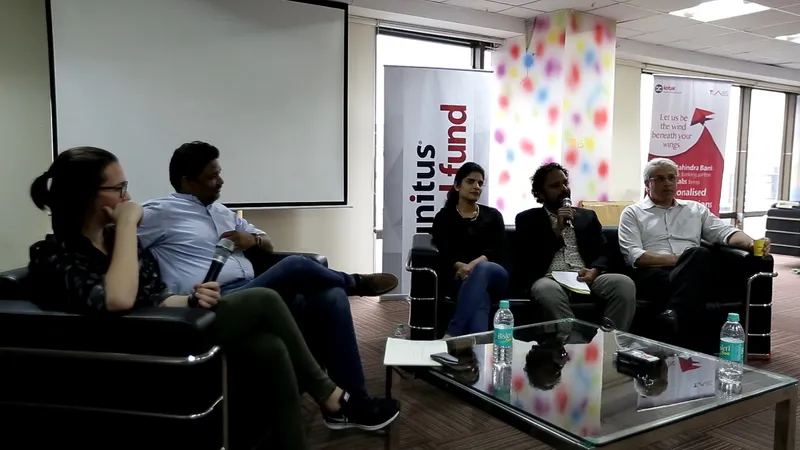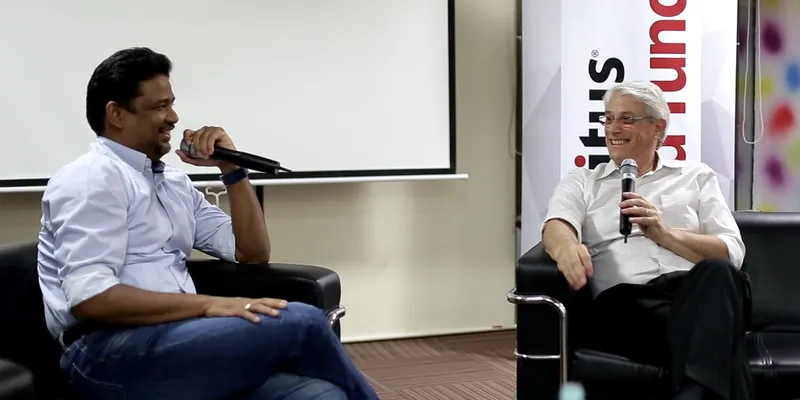Accelerators are like pressure cookers and not magic wands: 10 takeaways from the Unitus Seed Fund Speed2Seed programme
Startups and accelerators gathered at TLabs in Bengaluru recently for a round of discussions on how to boost the startup ecosystem in India via better cooperation and capacity building (see also YourStory’s ‘Startup Hatch’ series of profiles of accelerators, incubators and makerspaces).

The event and startup pitch competition was part of Unitus Seed Fund’s India Impact Acceleration Program titled Speed2Seed, made possible in part by US Global Development Lab, a programme of USAID. Launched earlier in 2015, it helps early-stage startups raise capital. Unitus has teamed up with 11 business accelerators and incubators, including Catalyzer, Khosla Labs, IIM Calcutta, Deshpande Foundation and Startup Oasis for this initiative. Here are my 10 key takeaways from the event.
1. Accelerators can be great – but are not a magic wand
Three startups at the event shared their experience with accelerators: PratiLipi, HackerEarth and RazorPay. Accelerators are particularly useful for first-time founders, especially in the post-college stage. International accelerators provide global expertise which is otherwise hard to obtain. Accelerators also help bring in corporate practices in growth and operations.
However, accelerators do not have a magic wand – it is not enough to just get into an accelerator, cautioned the startups, who have had experience with accelerators such as GSF, TLabs and Y Combinator.
2. The learning habit
Accelerators provide a great learning journey for startups. For example, they help set customer targets (eg. speak to at least five customers per day), and to realise the basic ‘stupid’ things that are so easy to overlook by first-time founders. They help founders realise that it is okay to make mistakes, as long as they learn from these errors.
Accelerators also help set realistic metrics, for example, just meeting a VC is not enough. Regular meetings and stocktaking with the accelerator team may seem repetitive and wasteful, but eventually help the startup to focus and sell. It is easy for founders to get complacent when they launch their first product, but accelerators help inculcate a sense of clarity and urgency.
3. Startups should also become smart in assessing accelerators
There seems to be a bewildering proliferation of accelerators these days in India, and it can be confusing for a founder to figure out which one to apply to. It, therefore, helps to talk to past portfolio companies of the accelerator to see what they have (or have not) gained from their accelerator experience in terms of advice, community and money.
The current generation of startups is very lucky, they can learn from the lessons and mistakes of previous generations of entrepreneurs; there is also tons of information accessible online, the panellists advised, pointing to LinkedIn and Quora discussions as examples.
Startups should also understand the difference between an accelerator and an incubator. Abhishek Gupta, COO of TLabs pointed out that incubators often do not take a stake in their startups; they offer longer residency periods and may transfer some academic research to the startups.

4. Momentum is picking up in India
“India’s ‘base’ level startups are becoming more mature. India is on the cusp of incredible growth,” observed ace investor and advisor Dan Kranzler. “Being an entrepreneur is like climbing Mt Everest,” he said. Accelerators are helping founders master the art of the product pitch. “To pitch successfully, think and talk like an investor,” advised Dan (see also my earlier article on pitch tips via TiE Bangalore).
This was effectively shown by pitches from seven shortlisted startups: Magasool Agro, Projects for Schools, Agmart, Transity, CounterfeitIQ, BharatRohan and Organic Thali. The founders were asked probing questions on market segmentation, price points, product differentiation and quality control (also check out ‘The startup question bank: 40 key questions for founders’).
5. Silicon Valley operates at 10X
Silicon Valley startups and accelerators operate at 10X the scale of India, according to some of the startup panellists; lots of work is needed in India. Y-Combinator is of course hard to replicate; DropBox and AirBnB were some of its great success stories across the world – India still has to come up with its global success stories from accelerators, or build powerful mentorship networks.
Many accelerators are struggling to get their model right, but India has a lot of latent expertise that can be tapped as mentors and business customers for startups. “Indian accelerators need to ‘unpack’ success factors and grow the ecosystem,” suggested Dan.
6. Batches or cohorts are not the only model
Some accelerators operate in cohort model, i.e. startups are admitted in batches, which makes it easy to have pitch competitions and to have knowledge sharing between startups at similar stages of growth.
But this also means accelerators may miss out on promising startups simply because they were too late or too early to apply for one particular cohort. Hence, accelerator TLabs now admits startups into its programme as and when the need or opportunity arises.
7. Accelerator types
A panel with speakers from Microsoft Accelerator, 500 Startups and TLabs shared insights into different accelerator models. Corporate accelerators look more for synergy and platform play than equity, explained Bala Girisaballa, Director of Microsoft Accelerator. The accelerator is funded by the sales team and not R&D.
500 Startups operates across 60 countries and graduates 120 startups each year; it is also working on the India ecosystem. “An accelerator is like a pressure cooker,” said Dan, explaining how the goal of all accelerators is to focus on growth and even hyper-growth.
8. Accelerators and mentors
Accelerators can provide mentors, but founders need to understand how to engage with them. “The mentor’s job is to ask tough questions, not grab the reins from a founder,” Dan pointed out.
“Indian founders need to understand how to ask questions; they often have mentor discussions but nothing comes out,” observed Abhishek of TLabs. Subject matter experts and corporate stars are not necessarily good mentors for startups; fellow entrepreneurs make for better mentors (see also my related article, ‘Understanding the science and art of engaging advisors and mentors’).
9. Government funding
There are diverse opinions on the Indian government's involvement in accelerators and incubators. Indian government getting into incubators with big plans and money is not necessarily a good thing; they should create a committee of entrepreneurs to decide who gets government funds, said Abhishek of TLabs.
Indian government involvement in incubators is a good thing, countered Bala of Microsoft Accelerator. Acceleration is not about valuation but generating entrepreneurial capacity within the country – especially beyond the metros.

10. Industry cooperation is key
Alliances are needed between investors, accelerators and incubators to improve talent management, mentorship connects, and curriculum. Unitus’ partnership is a good example in this regard, with incubators and accelerator such as Amity Innovation Incubator (Noida), Catalyzer (Hyderabad), CIBA (Goa), CIE (IIITH), Deshpande Foundation (Hubli), Startup Oasis (Jaipur), Startup Village (Kochi), and VIT TBI (Vellore).
“It can help if accelerators join hands and educate or grow the market,” said Shalini Prakash, Principal at 500 Startups in India. From the corporate side, NASSCOM has a round-table for accelerators, said Bala of Microsoft.
Unitus’ research with a sample of over 50 incubators in India indicates that only about five percent of incubated graduates are receiving angel or venture capital investment, as compared to 25 percent for accelerators.
“It’s a heady mix when people help each other to get a startup to take off,” summed up Abhishek Gupta of TLabs, while also cautioning that there seems to be a ‘dotcom boom mania’ in the accelerator sector now.
Entrepreneurship is not for everyone, added Dan; there is a difference between an idea, a vision, an entrepreneur and a startup. For those with the right combination of ambition, product and need, accelerators are a good match. “Be the best in the world at something! Accelerators recognise brilliance,” he concluded.







